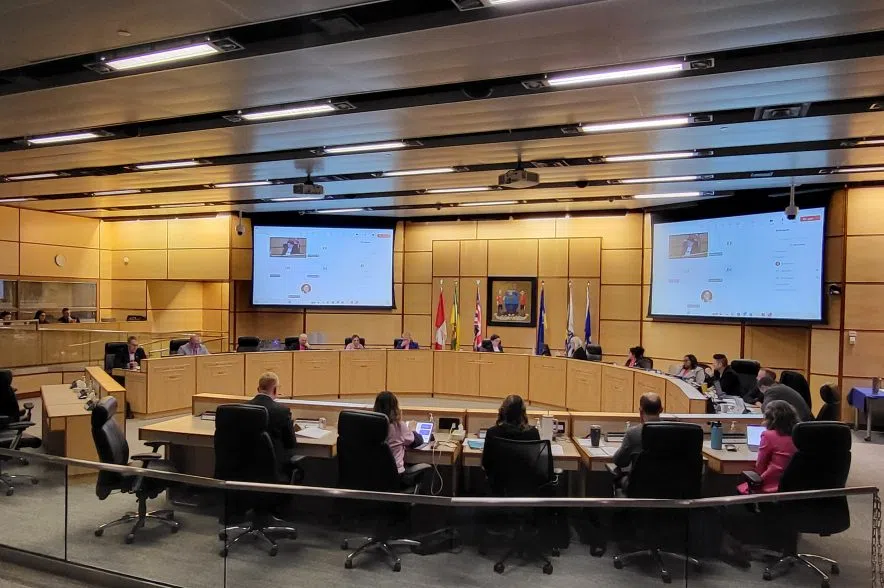Representatives of the Regina Exhibition Association Limited (REAL) presented the municipal corporation’s 2025 budget request to executive committee on Wednesday.
Its initial request was roughly $12.7 million as REAL’s new board continues on its quest to find a sustainable business model.
REAL’s request was made up of four distinct parts — its operating budget, capital budget, debt financing and cash flow management.
The executive committee ultimately voted to refer REAL’s request to the week of March 17, for budget deliberations.
REAL said it also requires $10 million in the next three years for repairs to the Brandt Centre Queensbury Centre and Co-operators Centre. For 2025, REAL is seeking $1 million for those repairs.
REAL projected $41.3 million in revenue this year while projecting expenses to be $45.5 million.
Numerous councillors stated that residents have often expressed concern to them about providing more taxpayer dollars to REAL.
Coun. Jason Mancinelli said he did not want to see REAL fail but said the municipal corporation could play a more active role in attempting to earn revenue.
“I want to be cooperative but at the same time, I’m also not interested in collecting taxes off people ahead of time when there’s potential to earn the money instead,” Mancinelli said.
REAL’s Christine Short said it’s experienced almost a 19 per cent increase in inflation since the pandemic. She added that when REAL is trying to recoup money on food and beverages or charge for additional room rates — it battles against other competitive rentals in the city.
She also said REAL competes for national conferences and trade shows with venues across the country that receive some level of funding from their respective municipalities.
“We are doing our very very best to become profitable, but it’s going to take us some time,” Short said.
REAL said it received about 3.5 million visitors every year.
Updates on Halifax shelter tabled
City administration provided Regina’s executive committee with an update on how its consultations have been going with community members and stakeholders regarding the upcoming permanent emergency shelter on Halifax Street.
Ultimately, council voted to table the discussion to conduct more consultation with community members.
The shelter is scheduled to open in July.
Some nearby businesses and stakeholders within the Heritage neighbourhood have previously expressed concern about worker and customer safety and litter.
Council had previously directed city administration to create a neighbourhood maintenance compensation plan that would support affected businesses within 250 metres of the shelter.
However, this was removed from the list of recommendations to allow for further consultation.
Steve Klippenstein of Fella and Fetch said he was disappointed in council’s decision to remove this provision, saying the unknown cost of how the shelter will affect things will fall on businesses in the area.
“We need those provisions for financial compensation to be able to address those (concerns) because we simply cannot possibly afford to build what’s needed to ensure the safety of our customers and our staff,” he said.

Mayor Chad Bachynski said the city needs more time to get things and address community concerns regarding the shelter. (Daniel Reech/980 CJME)
Mayor Chad Bachynski told media that compensation for businesses is still an option in the future, and wasn’t struck down despite it being removed from the list of recommendations.
“It didn’t resonate that way, which I think was another reason it was important that we take some time to make sure we get it right,” he said. “We have to make sure the engagement is incorporated into what we do moving forward.”
Klippenstein and other expressed unease about what could occur outside of the shelter which is beyond the supervision and control of Regina Treaty/Status Indian Service Inc.
(RT/SIS) which runs the shelter.
He and other delegates suggested that the shelter looks after the model of Oskana in terms of its perimeter security and cleanliness.
Wendy Miller of the Heritage Community Association (HCA) praised the city for its consultation meetings but also stressed the importance of relationship building – saying there was an extreme sense of mistrust for the city and services like the Regina Police Service.
“We realize that this is uncharted territory for a lot of us, with the shelter moving in and we acknowledge the vulnerable folk, but as HCA, we also need to acknowledge our residents and the businesses who play a big part in that community,” Miller said.
Miller also suggested the idea of allocating funds for a Heritage Street Team akin to the Regina Downtown Business Improvement District’s Regina Street Team.
As part of a partnership with the provincial government, the city got $1 million dollars to fund the Nest temporary shelter in 2024.
Current costs at the Nest Health Centre are about $50,000 per month.
The new shelter would be funded through existing sources including $3 million (one-time) from the federal Housing and Transit Fund, a forgivable $3 million loan from the Sask Housing Corporation, $1.5 million from the federal Unsheltered Homelessness and Encampments Initiatives and $1 million from the city’s annual budget.
Recycling stewardship program changes
Regina’s executive committee also unanimously decided to approve changes to the city’s recycling stewardship program. Glass will no longer be accepted in blue bins as part of the changes.
The city will continue to do roadside pick-up for recycling but SK Recycles will handle the processing of materials.
Residents will be able to recycle shipping boxes, plastic containers, magazines, telephone books and other materials.
City staff said residents will also receive more information about these changes in the future.
City administration said the changes will provide Regina with more cost-savings. It will also standardize the city’s recycling practices with the rest of the province.
“There’s actually a net increase in what we will be collecting, but it’s just going by a provincial model,” Bachynski said.
He said this measure could be a good step to extending the lifespan of the city’s landfill.











